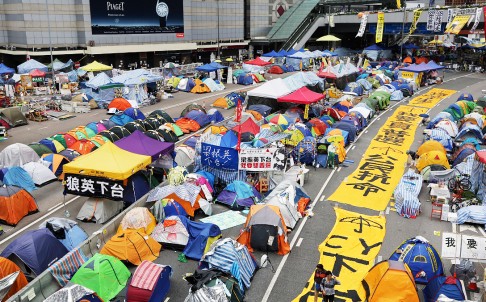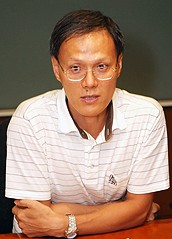
Occupy Central
Occupy Central is a civil disobedience movement which began in Hong Kong on September 28, 2014. It calls on thousands of protesters to block roads and paralyse Hong Kong's financial district if the Beijing and Hong Kong governments do not agree to implement universal suffrage for the chief executive election in 2017 and the Legislative Council elections in 2020 according to "international standards." The movement was initiated by Benny Tai Yiu-ting (戴耀廷), an associate professor of law at the University of Hong Kong, in January 2013.

Umbrella Movement
The Umbrella Movement (Chinese: 雨傘運動; pinyin: yǔsǎn yùndòng) is a loose political movement that was created spontaneously during the Hong Kong protests of 2014. Its name derives from the recognition of the umbrella as a symbol of defiance and resistance against the Hong Kong government, and the united grass-roots objection to the decision of the Standing Committee of the National People's Congress (NPCSC) of 31 August.
The movement consists of individuals numbering in the tens of thousands who participated in the protests that began on 28 September 2014, although Scholarism, the Hong Kong Federation of Students, Occupy Central with Love and Peace, groups are principally driving the demands for the rescission of the NPCSC decision.
The movement consists of individuals numbering in the tens of thousands who participated in the protests that began on 28 September 2014, although Scholarism, the Hong Kong Federation of Students, Occupy Central with Love and Peace, groups are principally driving the demands for the rescission of the NPCSC decision.
POST OCCUPY CENTRAL - DAY 95:
Full coverage of the day’s events on 20-03

Hong Kong courts 'impartial' in face of Occupy movement, says Beijing think tank report
Injunction orders to clear protest sites boosted confidence in rule of law, mainland report says

Courts in Hong Kong could remain impartial when handling cases relating to last year's Occupy Central movement although the pro-democracy protests had sparked concerns on respect for the city's rule of law, according to a report by a Beijing think tank.
A chapter on Hong Kong in the latest blue book on nationwide rule of law, published yesterday by the Chinese Academy of Social Sciences, said the illegal blockade of roads in pursuit of democracy constituted "the biggest challenge to the city's rule of law" since the 1997 handover.
But the chapter's writer, Professor Lin Feng, associate dean of the school of law at City University in Hong Kong, concluded that the performance of courts in ruling on applications for injunctions to clear protest sites had "boosted people's confidence on the future of the rule of law in Hong Kong".
Lin's assessment was in stark contrast to that of academy legal scholar Chen Xinxin who previously argued that the 79-day civil disobedience movement - which tried to force Beijing to change its stringent framework for the 2017 chief executive election - undermined the rule of law.
"The deliberate illegal behaviour [by protesters] would give other people a wrong impression that they would not be arrested as long as there were enough people participating in the illegal movement," Lin wrote. "The rule of law would have been eroded if that illegal behaviour had become common in the community."
He added: "Fortunately, the judiciary in Hong Kong has maintained its impartiality and independence even in handling the cases relating to Occupy movement."
Lin, who stressed that his paper did not represent the views of the central government, told the South China Morning Post that Hongkongers had continued to respect the rule of law. "I think the Occupy movement was an individual case … it did not bring a huge negative impact to the city's core value," he said.
Lin also said genuine universal suffrage could be achieved by reforming the composition of and election methods for the 1,200-strong nominating committee. The committee will be tasked with approving two or three candidates for the 2017 poll.
Civic Party lawmaker Ronny Tong Ka-wah, a barrister, said the blue book statement on Occupy Central was "relatively fair".
During Occupy, he said, many pro-establishment politicians and legal experts were worried "because many people refused to accept the court's injunctions, but this problem doesn't exist any more. Occupy also ended because of an injunction".

Reform poll plan gains favor
A proposal for the government to conduct a poll on political reform when it is unveiled next month is gaining traction among pro- establishment groups.
The poll, suggested by Basic Law Committee member Albert Chan Hung-yee, would be led by former chief justices or judges with local universities involved.
Chan, a University of Hong Kong law professor, said yesterday that former judges and universities' pollsters could design a questionnaire together to ensure questions are raised in an objective and balanced way to gather citizens' views on political reform.
Before the poll, Chan also suggested holding a televised debate between the pro- establishment and pan-democratic camps to allow citizens to understand the principles of both sides.
"If the poll shows only a small number of people support the pan-democrats' veto on political reform, I believe it will have an impact on some pan-democratic lawmakers' voting stance," he said.
Executive Council member Cheung Chi- kong said Chan's proposal is worth considering and added he is willing to cooperate with HKU Public Opinion Programme director Robert Chung Ting-yiu on a poll.
For his part, Chung said: "I do not have any reservations in cooperating with Cheung or any other research on conducting opinion surveys, provided they are scientific and comply with professional standards."
Another Exco member, Fanny Law Fan Chiu-fun, said she preferred Chan's suggestion of a poll rather than a referendum, and it could be conducted by an impartial organization with a sample size of about 2,000 to 3,000 citizens.
"If the number of people who support political reform [in the poll] is more than those who do not, Legco should pass the political reform."
Democratic Party chief Emily Lau Wai- hing said the government has to pledge to restart a "five-step" procedure on political reform consultation if the poll shows citizens generally not accepting political reform.



沒有留言:
張貼留言